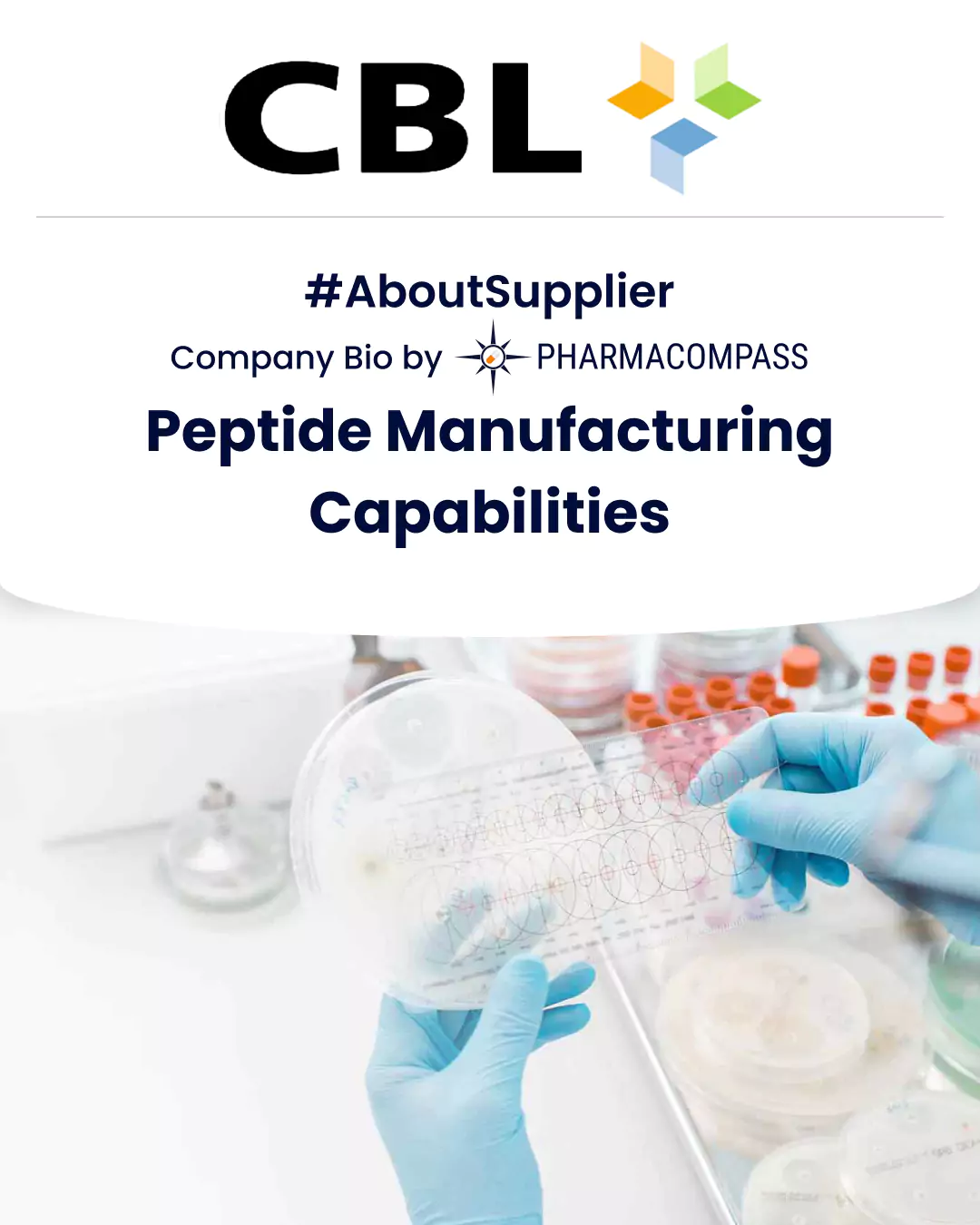
By PharmaCompass
2022-12-01
Impressions: 5560
Overview of peptide development & contract manufacturing services & more on CBL's CDMO & CMO services for non-GMP & cGMP peptides on PharmaCompass.
What are peptides?
A peptide is a short chain of two or more amino acids that are connected to one another by an amide-type of covalent chemical bond. Amino acids are the building blocks of proteins and peptides are distinguished from proteins by their shorter length.
Peptides can act as growth factors, neurotransmitters, ion channel ligands, anti-infectives, hormones, etc. Several pharmaceutical and cosmetic products use different peptides for their potential anti-aging, anti-inflammatory, fat-burning and muscle-building properties. Synthetic therapeutic peptide APIs have several important applications in biochemistry, molecular biology, immunology and medicine.
Peptide manufacturing has changed considerably over time and has led to innovative techniques for peptide API production. There are more than 80 peptide-based drugs currently available in the market that are used to treat conditions like cancer, chronic pain, diabetes, osteoporosis, HIV infection and multiple sclerosis. Hence, the demand for peptide-based therapeutics is increasing at a considerable pace.
Peptide active pharmaceutical ingredients (APIs) are highly selective. They have high specificity, affinity, less drug-drug interactions, diverse biological and chemical activities and are effective at lower doses, thus reducing toxicity levels. Peptides may be easier for the body to absorb than proteins. Peptides enter the bloodstream more quickly as they can easily pass through the skin and intestines.
Peptides are a complex class of drugs and have proven to be a challenge from the manufacturing point of view. Peptides with shorter lengths (up to 10 amino acids) are manufactured by liquid phase peptide synthesis. Segment condensation and ligation techniques are used for longer peptides (up to 120 amino acids).
There are several pharmaceutical contract development and manufacturing organizations (CDMOs) and contract manufacturing organizations (CMOs) that offer custom peptide production, GMP contract peptide manufacturing, custom peptides development and synthetic peptide API manufacturing.
What are the different approaches for synthesis of peptides?
Peptides are produced using various methods such as solid phase peptide synthesis (SPPS), liquid-phase peptide synthesis, hybrid solid/solution phase synthesis, fragment condensation and other novel technologies.
Solid- and liquid-phase synthesis are the most commonly used methods for peptide API manufacturing.
- LPPS : Liquid-phase peptide synthesis
Liquid-phase peptide synthesis is a classical approach to custom peptide synthesis and is used to produce peptides on a large scale for industrial purposes. Early peptide synthesis was carried out in solution and required careful manipulation of protecting groups and multiple challenging workups and isolations. The liquid-phase approach is used to synthesize short peptides such as di- and tripeptides, along with C-terminally modified peptides such as enzyme substrates.
Liquid phase peptide synthesis, on the other hand, can be advantageous as the quantities of products increase. This methodology can be problematic for the synthesis of longer and more complex peptides, but it works well for shorter peptides and fragments.
- SPPS : Solid-phase Peptide Synthesis
Peptide synthesis became a more practical part of contemporary scientific research following the advent of solid-phase techniques. Solid-phase peptide synthesis (SPPS) is the recommended technique for chemical peptide synthesis, which enables routine synthesis of any type of peptide sequence, including complex or cyclic custom peptides.
Synthetic therapeutic peptide APIs can be synthesized automatically using solid phase peptide synthesis (SPPS). It entails adding protected amino acids in stages to a growing peptide chain joined to a solid-state resin particle by a covalent bond. It is the essence of solid-phase technique where reactions are driven to completion by the use of extra soluble reagents, which can be eliminated by simple filtration and washing without manipulative losses.
However, SPPS is far from perfect, especially in terms of greenness. SPPS has been widely adapted in the pharmaceutical sector because it can be automated and is scalable, and it is now being used to produce a range of marketed peptide-based drugs.
The advantages of solid phase peptide synthesis (SPPS) include easy purification, shorter process development, higher cost efficiency, rapid generation of linear peptide intermediates and the availability of fully automated production techniques. It can also be competitive in large-scale processes and is used to produce longer sequences and complex peptide API (active pharmaceutical ingredient).
Synthetic peptide API manufacturing, complex peptide synthesis and purification present a number of challenges, including complexities associated with long chain macromolecules, which are known to have an impact on product yield and purity. Currently, various peptide CDMOs (contract development and manufacturing organizations) offer services for the clinical development and GMP contract peptide manufacturing.
Why do pharmaceutical companies need CDMOs for the development and manufacturing of peptides?
The interest of pharmaceutical companies in peptide drugs have continued to grow over the last two decades, and drugmakers are now turning to peptide contract manufacturers for the production of these drugs. The contract development and manufacturing organization (CDMO) sector is now considered a vital source of peptide drug development and manufacturing services, from clinical development to commercial manufacturing.
As the market for cancer, diabetes, HIV infection, multiple sclerosis drugs continues to grow at a healthy pace, pharmaceutical companies are increasingly looking for more assistance from contract development and manufacturing organizations (CDMOs) and contract manufacturing organizations (CMOs) with proven track records for the safe production of synthetic therapeutic peptide APIs.
- Full-service CDMOs possess a remarkable depth of experience and specialization in the development and manufacturing of APIs. CDMOs help to meet production deadlines by allowing manufacturers to change production volume, add a drug variation or scale up without incurring additional expenses for labor, facility space, etc.
- Outsourcing services to a contract development and manufacturing organization gives companies access to a larger number of equipment and facilities for the production of complex peptide active pharmaceutical ingredients.
- For GMP contract peptide manufacturing, pharmaceutical companies are increasingly looking for Contract Development & Manufacturing Organizations (CDMOs) that can provide a pathway from research and pilot labs all the way through commercial manufacturing, depending on the requirement.
- Large pharmaceutical companies are increasingly relying on outsourced facilities to provide the CDMO market the opportunity to flourish and eliminate expenses associated with purchasing specialized equipment, as CDMOs have access to both equipment and facilities.
- Pharmaceutical CDMOs not only help companies in meeting deadlines and scaling up faster for peptide APIs, but they also reduce infrastructure costs by reducing or eliminating the requirement for additional production.
- Pharmaceutical CDMOs and CMOs are highly competitive, constantly striving to produce better quality products in higher quantities, faster, and at cheaper rates. Due to increasing complexities of peptide APIs, pharma companies have become more dependent on outsourcing services.
What are the different factors one should consider while selecting a peptide contract manufacturer?
Before choosing a contract peptide API manufacturing or custom peptide synthesis partner for your peptide drug candidate, make sure about their regulatory capabilities, scale-up synthetic peptide API manufacturing versatility.
Here are a few factors that you should consider while selecting a peptide contract manufacturer for your peptide active pharmaceutical ingredients (APIs):
- When you are choosing a CDMO partner for contract peptide API manufacturing, the first thing you need to do is to make sure that the CDMO has the technical expertise and experience to handle your peptide-based products.
- Visit the CDMO's facilities and evaluate the equipment and procedures for the manufacturing of peptide active pharmaceutical ingredients (APIs).
- Make sure that the CDMO you are choosing for contract peptide API manufacturing is offering the flexibility, collaboration and innovation that you require for Peptide Active Pharmaceutical Ingredients (APIs).
- Quality should always be the most important factor to be considered while selecting a peptide CDMO (contract development and manufacturing organization).
- Peptide CDMO partners should be selected on the basis of their compatibility with your marketing plans at each stage of the lifecycle of your product. If the final market for your product is the US, make sure that the peptide contract manufacturer is FDA inspected.
What pharmaceutical peptide manufacturing services does CBL offer?
There has been a revival of peptide APIs in recent years as the pharma industry has once again turned its focus towards the potential of therapeutic peptides. Peptide drug development is a complex process. Partnering with the right pharmaceutical contract development and manufacturing organization (CDMO) makes it easier to meet deadlines and scale up faster, while also saving money and time.
One of the largest peptide material suppliers in the world, CBL Patras offers peptide starting materials, peptide intermediates, along with industrial and commercial-scale manufacturing of proprietary and generic GMP and non-GMP peptides. CBL develops partnerships that grow from the laboratory scale to commercial production by using its facilities that can accommodate programs from the gram to ton range.
CBL is a leading manufacturer and developer of innovative reagents for custom peptide synthesis. A catalog of more than 400 compounds are available for solid-phase organic and peptide synthesis. CBL is specialized in the production of pharmaceutical peptides from clinical development to commercial manufacturing. When it comes to outsourcing peptide manufacturing or custom peptide production, CBL will work with your company to provide affordable and time-efficient contract services.
CBL has four laboratory and manufacturing buildings spread over 10,000 square meters. Its highly automated, efficient facilities enable CBL to operate from the gram to ton scale, both for solid phase synthesis as well as solution phase synthesis. CBL's state-of-the-art equipment and facilities have been built specifically for custom peptide synthesis, setting new benchmarks for GMP custom peptide development on both small and large scales.
The PharmaCompass Newsletter – Sign Up, Stay Ahead
Feedback, help us to improve. Click here
Image Credit : Biosynthesis, tech advancements by PharmaCompass license under CC BY 2.0
“ The article is based on the information available in public and which the author believes to be true. The author is not disseminating any information, which the author believes or knows, is confidential or in conflict with the privacy of any person. The views expressed or information supplied through this article is mere opinion and observation of the author. The author does not intend to defame, insult or, cause loss or damage to anyone, in any manner, through this article.”








